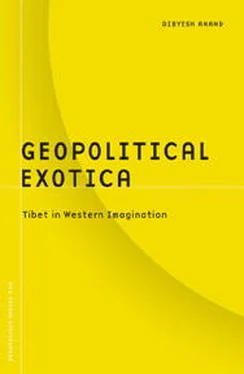Though in everyday conversation we tend to use stereotypes only for negative images, stereotyping has within it dualism and ambivalence (Bhabha 1983; Chow 1993; Hall 1997a). As Hunt in his study of hierarchy of race and American foreign policy points out, the Americans created for "Orientals" two distinctly different images: "a positive one, appropriate for happy times when paternalism and benevolence were in season, and a negative one, suited to those tense periods when abuse or aggrandizement became the order of the day" (1987, 69). While sometimes a positive stereotype may be politically and socially helpful for a group, in the long run it reifies and imprisons the represented subjects in their own arrested image. This problem can be seen most clearly in the case of Tibetans, who seem to be prisoners of their stereotyped images. Alluding to the real effects of the language of stereotype about Tibet, Lopez points out that it "not only creates knowledge about Tibet, in many ways it creates Tibet, a Tibet that Tibetans in exile have come to appropriate and deploy in an effort to gain both standing in exile and independence for their country" (1998, 10). However, these stereotypes legitimize only certain goals and actions geared toward achieving them-the prevalent stereotypes paint Tibetans mainly as passive victims requiring outside help. And this outside support comes at a price.
STRATEGIES OF REPRESENTATION
In spite of commonalities and consistencies, it is complexity, opposi-tionality, and ambivalence that lie at the heart of Western colonial representations. Imaginative practices through which the imperial West came to represent the Other can be interrogated through the various strategies of representation involved. Though there was always a will to reify the represented, this was undermined by the nature of representation-it was not a singular act but one necessitating repetition. There always was a paradox in the Western representations of other cultures-an unresolvable tension between transparency and inscrutability, desire and disavowal, difference and familiarity. Therefore Exotica Tibet is not a distinct phenomenon devoid of contrariety; rather, it is defined by a "true complexio oppositorum, a rich complexity of contradictions and oppositions" (Bishop 1989, 63, emphasis in original). So near, yet so far! As Zizek puts it:
The very inconsistency of this image of Tibet, with its direct coincidence of opposites, seems to bear witness to its fantasmatic status. Tibetans are portrayed as people leading a simple life of spiritual satisfaction, fully accepting their fate, liberated from the excessive craving of the Western subject who is always searching for more, AND as a bunch of filthy, cheating, cruel, sexually promiscuous primitives… The social order is presented as a model of organic harmony, AND as the tyranny of the cruel corrupted theocracy keeping ordinary people ignorant. (2001, 64-66; emphasis in original).
The following section of the chapter analyzes the most common discursive strategies marshaled in the representation of the non-Western Other in the context of Western imperialism and uses Exotica Tibet as the main empirical site of investigation.
Gaze
Surveillance is a technique through which, under an overpowering gaze, the non-Western subject is rendered "a knowable, visible object of disciplinary power" (Doty 1996b, 11). The gaze is not mere innocent curiosity: "to gaze implies more than to look at-it signifies a psychological relationship of power, in which the gazer is superior to the object of the gaze" (Schroeder 1998, 208). Through observation, examination, and interpretation objects are differentiated, categorized, identified, and made ready to be acted upon. Objectification (fixing the essence) of the gazed goes hand in hand with its subjectification-gaze and surveillance are productive of the identity of the gazed.
Surveillance as a strategy for representing the Other and rendering it disciplined is characterized by the all-knowing gaze of a white
"man," the colonial master, the West. It enables both the visual possession of the body of the gazed and an interposition of technique that safely conceals the body of the gazer (Spurr 1993, 22). Observations then are presented as dispassionate, objective facts. The gaze is disembodied-statements are made as if there is no seer behind the observations.
This is not to say that non- Westerners are visually impaired, powerless to gaze back at the West. But the authority of imperialism for a large part of the modern period ensured that mastery and control remained a possession of Western "man." The "monarch of all I survey" rhetorical gesture remained peculiar to the West (Pratt 1992, 201). Establishment of mastery through surveillance, gaze, and observation was accompanied by consolidation of shades of political dominance over the object of the gaze. Appropriation was done in the name of scientific curiosity, ethnographic material gathering, protection of simple masses from their own despotic rulers, or the spread of progress.
British colonial and military officials who went inside Tibet often wrote their accounts as scientific exploration or as exciting adventure (see Bailey 1957; Forman 1936) or as "everyday" observation (Gordon 1876, v). Behind their innocent-sounding descriptions of travel-for example, "[a] narrative of a plant hunter's adventures and discoveries" (Ward 1934)-lay the violence of imperialism. Though their gaze might be considered by Europeans as that of the adventurer or romantic, its effect on the natives was the same as that of some steely-eyed militarist's gaze-the establishment and in-stitutionalization of control through political rule and knowledge formation. To know is a prelude to possessing, especially if there is a huge asymmetry of power. Such asymmetry led to situations where it was perfectly acceptable for a participant in the Tibet mission of 1903-4 to say, "In fact the visible riches and treasures of Lhasa fairly made our mouths water. The Tibetans however would not sell, and to our honour be it said; although Lhasa was a fair object to loot, and lay in our power, not a farthings worth was forcibly [author adds this word in pen in a typed text] taken from it" (IOR: MSS EUR/C270/FL2/E/1/144, 6; emphasis added; see Carrington 2003 for an analysis of the predatory nature of the mission). Securing priceless artifacts through coercion and displaying them in the private and public collections in the West was an essential feature of Western imperialism.
Paradoxically, the project of rendering the Other knowable and the image of it as primitive and simple went hand in hand with the recognition that there are elements of inscrutability and mystery that eluded complete understanding of the Other. While discussing his own failure to fathom the unease of Phuntsog, a Tibetan who is no longer considered an "authentic" native as he has learned the language of the imperialist, Candler, an early example of embedded reporter (a Daily Mail reporter accompanying the British invasion of Tibet in 1903-4), calls him a "strange hybrid product of restless western energies, stirring and muddying the shallows of the Eastern mind. Or are they depths? Who knows? I know nothing, only that these men are inscrutable, and one cannot see into their hearts" (1905, 206).
Frustrated with the inaccessibility, invisibility, and inscrutability of "the Orientals," Western desire subjects them to a relentless investigation. Veil becomes a metaphor for all that invites, titillates, and yet resists Western knowing. It is "one of those tropes through which Western fantasies of penetration into the mysteries of the Orient and access to the interiority of the other are fantasmatically achieved" (Yegenoglu 1998, 39).
Surveillance and gaze facilitate other representational strategies that fix the Orient and the Other, particularly those that seek to classify, differentiate, and provide identity to the Other (and in turn to the Self).
Читать дальше












